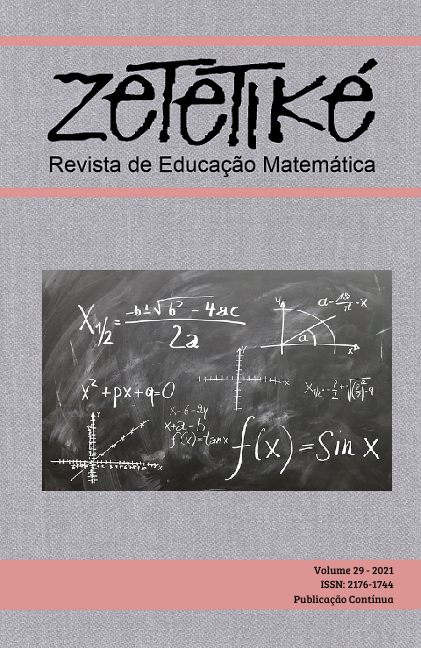Abstract
Our article aims at better understanding the meaning of future mathematics teachers’ scores on the Brazilian National Higher Education Exam (ENADE). Our approach is based on the proportion of right answers on the multiple choice questions about mathematical knowledge applied to future mathematics teachers at ENADE 2017. First, we considered the proportion of right answers to questions whose content were identified by the creators of the exam as part of the curriculum of High School. Second, we complemented the analysis by comparing the knowledge required by a few questions in ENADE with the content of questions of the National Exam for High School (ENEM). The conclusions show that most of future mathematics teachers conclude their initial education without developing knowledge on topics taught in High School.
References
Ball, D. L., Thames, M. H., & Phelps, G. (2008). Content Knowledge for Teaching: What Makes It Special? Journal of Teacher Education, 59(5), 389–407. DOI: https://doi.org/10.1177/0022487108324554
Barros, J. L. C., Campos, M. Z., Teixeira, D. D. C., & Cabral, B. G. A. T. (2020). Reflexões sobre o nível de conhecimentos específicos dos estudantes de licenciatura em Educação Fisica no Enade 2014. Revista Brasileira de Estudos Pedagógicos, 101(257), 99-119. DOI: https://doi.org/10.24109/2176-6681.rbep.101i257.4374
Baumert, J., Kunter, M., Blum, W., Brunner, M., Voss, T., Jordan, A., … Tsai, Y.-M. (2010). Teachers’ Mathematical Knowledge, Cognitive Activation in the Classroom, and Student Progress. American Educational Research Journal, 47(1), 133–180. DOI: https://doi.org/10.3102/0002831209345157
Begle, E. G. (1972) Teacher Knowledge and Student Achievement in Algebra, School Mathematics Study Group Reports Number, 9.
Brasil (2017). Instituto Nacional de Estudos e Pesquisas Educacionais Anísio Teixeira. Relatório Síntese de Área Matemática (Bacharelado/Licenciatura). Brasília. Disponível em: http://portal.inep.gov.br/educacao-superior/enade/outros-documentos.
Brasil (2019). Instituto Nacional de Estudos e Pesquisas Educacionais Anísio Teixeira. Relatório Brasil no PISA 2018 (Versão Preliminar), Brasília. Disponível em: http://download.inep.gov.br/acoes_internacionais/pisa/documentos/2019/relatorio_PISA_2018_preliminar.pdf.
Carrillo-Yañez, J., Climent, N., Montes, M., Contreras, L. C., Flores-Medrano, E., Escudero-Ávila, D., … Muñoz-Catalán, M. C. (2018). The mathematics teacher’s specialised knowledge (MTSK) model. Research in Mathematics Education, 20(3), 236–253. DOI: https://doi.org/10.1080/14794802.2018.1479981
Charalambous, C. Y., Hill, H. C., Chin, M. J., & McGinn, D. (2020). Mathematical content knowledge and knowledge for teaching: Exploring their distinguishability and contribution to student learning. Journal of Mathematics Teacher Education, 23(1), 579–613. DOI: https://doi.org/10.1007/s10857-019-09443-2
Costa, J. P. C., & Martins, M. I. (2014). O ENADE para a licenciatura em física: Uma proposta de matriz de referência. Revista Brasileira de Ensino de Física, 36 (3), 697-724.
Gatti, B.A., Barreto, E. S. S., & André, M. E. D. A. (2011). Políticas docentes no Brasil: um estado da arte. Brasília, DF: Unesco.
Gontijo, S. B. F. (2014). Implicações do ENADE para a organização do trabalho pedagógico e as práticas avaliativas em um curso de Pedagogia. Tese de Doutorado em Educação. Brasília: Universidade de Brasília.
Hoover, M., Mosvold, R., Ball, D. L., & Lai, Y. (2016). Making Progress on Mathematical Knowledge for Teaching. The Mathematics Enthusiast, 13(1), 3-34.
Leitão, T. M. S. P., Moriconi, G. M., Abrão, M., & Silva, D. S. (2010). Análise acerca do boicote dos estudantes aos exames de avaliação do ensino superior. Estudos em Avaliação Educacional, 21(45), 87-106. DOI: https://doi.org/10.18222/eae214520102028
Lima, P. S. N., Ambrósio, A. P. L., Ferreira, D. J., & Brancher, J. D. (2019). Análise de dados do Enade e Enem: Uma revisão sistemática da literatura. Avaliação: Revista da Avaliação da Educação Superior (Campinas), 24(1), 89–107. DOI: https://doi.org/10.1590/s1414-40772019000100006
Lorenzato, S. (2006) Para aprender matemática. Campinas: Autores Associados.
Moriconi, G. M., & Nascimento, P. A. M. M. (2014). Fatores associados ao desempenho dos concluintes de Engenharia no Enade 2011. Revista Estudos em Avaliação Educacional, 25(57), 248-278.
Primi, R., Silva, M. C. R., & Bartholomeu, D. (2018). A validade do ENADE para avaliação de cursos superiores: Uma abordagem multinível. Revista Examen, 2(2), 128–151.
Rothen, J. C., & Nasciutti, F. (2011). A Educação Superior em Prova: o perfil da educação superior apresentado pelos resultados do ENADE 2005 e 2006. Revista Diálogo Educacional, 11(32), 187-206.
Silva, M. C. R., Vendramini, C. M. M., & Lopes, F. L. (2010). Diferenças entre gênero e perfil sócio-econômico no Exame Nacional de Desempenho do Estudante. Avaliação, Campinas e Sorocaba, 15(3), 185-202.
Shulman, L. S. (1986). Those Who Understand: Knowledge Growth in Teaching. Educational Researcher, 15 (2), 4–14.

This work is licensed under a Creative Commons Attribution-NonCommercial-NoDerivatives 4.0 International License.
Copyright (c) 2021 Zetetike


